List of bazaars and souks
This is a list of bazaars and souqs.
Bazaars
Albania
In Albania, two distinct types of bazaar can be found; Bedesten (also known as bezistan, bezisten, bedesten) which refers to a covered bazaar and an open bazaar.
- Bazaar of Pristina, Kosovo
- Bazaar of Peć, Kosovo
- Pazari i Ri, Tirana
- The Old Bazaar, Gjakova
- The Old Bazaar of Korçë
- Kruje Bazaar
Australia
- Ingleburn Bazaar (held annually during the Ingleburn Festival)
Afghanistan
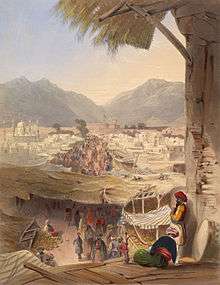 City of Kandahar, its principal bazaar and citadel, taken from the Nakkara Khauna from Lieutenant James Rattray, Afghanistan
City of Kandahar, its principal bazaar and citadel, taken from the Nakkara Khauna from Lieutenant James Rattray, Afghanistan An Afghan elder sits outside his store at the Anaba bazaar in Panjshir, Afghanistan
An Afghan elder sits outside his store at the Anaba bazaar in Panjshir, Afghanistan
 Ka Foroshi, the bird market in Kabul
Ka Foroshi, the bird market in Kabul
Azerbaijan
- Khan Bazar, Khankendi
- Kolkhoz (or Merkezi) Bazaar (Kolkhoz (Central) Bazaar), Sumgait
- Kohna Bazaar (Old Bazaar), Ganja
- Ortulu Bazar, Shamakhi
- Sharq Bazaar (East Bazaar), Baku
- Sharq Bazaar (East Bazaar), Sumgait
- Pasaj Bazary, Aghdam
- Teze Bazar (New Bazaar), Baku
- 8 Kilometre Bazaar, Baku
- Yashil Bazar (Green Bazaar), Baku
- Yeni Bazar, Shaki, Azerbaijan
- Zanbil Bazar (Basket Bazaar), Nakhchivan
 Big Bazaar, Lankaran, Azerbaijan
Big Bazaar, Lankaran, Azerbaijan
Bangladesh
In Bangladesh, a Haat bazaar (also known as hat or haat or hatt) refers to a regular produce market, typically held once or twice per week.[1]
- Amin Bazaar, Dhaka
- Bhairab Bazaar, Kishoreganj District
- Badshahi Chawk Bazaar (also known as Chowk Bazaar), Dhaka
- Dasherjangal Bazaar, Shariatpur District
- Jalchatra Bazaar, Bangladesh
- Kachukhet Bazaar, Dhaka
- Karwan Bazaar, Dhaka
- Kazir Dewri, Chittagong
- New Market Kacha Bazaar, Dhaka
- Malibagh Bazaar, Dhaka
- Banani Bazaar, Dhaka
- Khilkhet Kacha Bazaar, Dhaka
- Mohakhali Bazaar, Dhaka
- Moulvibazar, Moulvibazar Sadar Upazila, Moulvibazar District
- Shanti Nagar Bazaar, Dhaka
- BCC Road, Thatari Bazaar; Wari- Dhaka
 Dhaka Town Chowk, 1904
Dhaka Town Chowk, 1904- Basantapur Bazaar Chowk at Madhi, Chitwan
Bosnia and Herzegovina
- Baščaršija, Sarajevo
- Kujundžiluk, Mostar
China
- Grand Bazaar, Urumuqi, Xinjiang
- Monday Bazaar, Upal, Xinjiang
- Sunday Bazaar, Kashgar, Xinjiang
Egypt
.jpg) Two Egyptian women shopping at a market next to the Al-Ghouri Complex in Cairo, Egypt.
Two Egyptian women shopping at a market next to the Al-Ghouri Complex in Cairo, Egypt.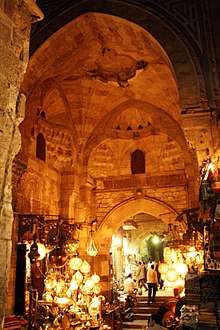 Khan el khalili, Cairo (interior)
Khan el khalili, Cairo (interior)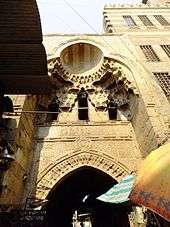 Khan al-khalili, bab al-qutn (gate)
Khan al-khalili, bab al-qutn (gate)_-_TIMEA.jpg) Shop of a Turkish Merchant in Kha'n El-Khalee'lee, 1836
Shop of a Turkish Merchant in Kha'n El-Khalee'lee, 1836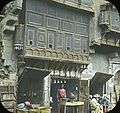 Arabic Window and Native Bazaar, Cairo
Arabic Window and Native Bazaar, Cairo
Hong Kong
- Harbour City Bazaar
- Petit Bazaar
Israel
- Old City of Jerusalem – there are many Bazaars in the Christian, Muslim and Jewish Quarters. the Armenian one does not include Bazaar of its own.
- Mahane Yehuda, Central Jerusalem
- Old Acre, Israel City of Acre
- Old City of Nazareth Bazaar
India
In India, and also Pakistan, a town or city's main market is known as a Saddar Bazaar.
Border bazaars
These are mutually agreed border bazaars and haats of India on borders of India with its neighbours.
Assam
- Paltan Bazaar Assam
- Pan Bazaar Guwahati, Assam
- Uzan Bazaar Guwahati, Assam
Bangalore, Karnataka
- Gandhi Bazaar, Bangalore
Chennai, Tamil Nadu
- Burma Bazaar, Chennai
- Pondy Bazaar, Chennai
Delhi and NCR
- In Delhi
- Arul Bazar, Delhi
- Chandni Chowk, Delhi
- Chawri Bazaar, Delhi (wholesale market)
- Chhota Bazaar Shahdara, Dehli
- Dilli Haat, Dehli – A Haat is a regular open-air produce market
- Khan Market, Delhi
- Meena Bazaar, Delhi
- Palika Bazaar, Delhi
- Sadar Bazaar, Delhi
- Urdu Bazaar (Delhi)
- In National Capital Region (NCR)
Hyderabad, Telangana
- Begum Bazar, Hyderabad
- Chatta Bazaar, Hyderabad, India
- Laad Bazaar, Hyderabad, India
- Shahran Bazaar, Hyderabad
- Sultan Bazar, Hyderabad
- Rythu bazaar, Telangana
Indore
- Sarafa Bazaar, Indore, India
Kerala, Keralam
- Chala Bazaar, Thiruvananthapuram, Kerala
- Rice Bazaar Thrissur, Kerala
Kolkata, West Bengal
- Burra Bazar, Kolkata
- Bowbazar, Kolkata
- Tiretta Bazaar, Kolkata
Mumbai, Maharashtra
- Bhendi Bazaar Mumbai
- Bhindi Bazaar, South Mumbai
- Chor Bazaar, Mumbai
- Zaveri Bazaar, Mumbai
Odisha
- Bhubaneswar Bazaar, Unit-1 BadaMarket, Bhubaneswar
- Gole Bazaar, Sambalpur
- Choudhury Bazaar, Cuttack
- Nua Bazaar, Cuttack
Punjab
- Chaura Bazaar Ludhiana, Punjab
- Chess Bazaar, Mohali, Punjab
Uttar Pradesh
- Aminabad Bazaar Luknow, Uttar Pradesh
- Bada Bazaar, Jhansi, Uttar Pradesh
- Hooseinabad Bazaar, Lucknow, Uttar Pradesh
- Lalganja Bazaar, Uttar Pradesh
- Meena Bazaar Lucknow, Uttar Pradesh
- Purani Najhai, Jhansi, Uttar Pradesh
- Sabzi Bazaar, Shihura Khurd Kalan, Uttar Pradesh
- Sadar Bazaar, Agra, Uttar Pradesh
- Sarafa Bazaar, Jhansi, Uttar Pradesh
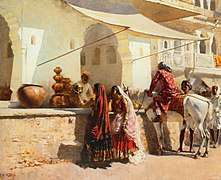 Women purchasing copper utensils in a bazaar by Edwin Lord Weeks, late 19th century
Women purchasing copper utensils in a bazaar by Edwin Lord Weeks, late 19th century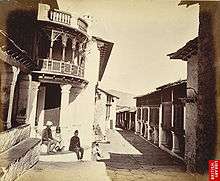 Almora Bazaar, Uttarakhand, c1860
Almora Bazaar, Uttarakhand, c1860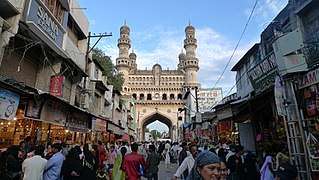 Laad Bazaar near Charminar, Hyderabad, India
Laad Bazaar near Charminar, Hyderabad, India.jpg) Paltan Bazaar, Assam, India
Paltan Bazaar, Assam, India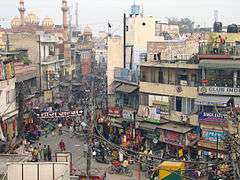 Cheh Tuti Chowk or Six Tuti Chowk, Main Bazaar, Paharganj
Cheh Tuti Chowk or Six Tuti Chowk, Main Bazaar, Paharganj Gateway to Hooseinabad Bazaar, Lucknow, c. 1863
Gateway to Hooseinabad Bazaar, Lucknow, c. 1863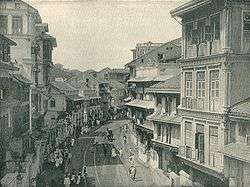 Bazaar along Kalbadevie Road, Bombay (now Mumbai), 1890
Bazaar along Kalbadevie Road, Bombay (now Mumbai), 1890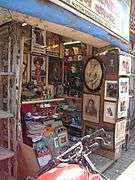 Antiques and old posters at Chor Market in Mumbai
Antiques and old posters at Chor Market in Mumbai
Indonesia
- Pasar Gambir, now Jakarta Fair, Jakarta
- id:Pasar Baru, Jakarta
- id:Pasar Turi, Surabaya
- Pasar Beringharjo, Yogyakarta
- id:Pasar Semawis, Semarang
- id:Pasar Gede Harjonagoro, Surakarta
Iran
- Ardabil Bazaar
- Bazaar of Borujerd
- Bazaar of Tabriz in Tabriz – an historic site that originally developed along the ancient silk routes; listed as a World Heritage Site[2]
- Isfahan Bazaar in Isfahan – historic site which dates to Safavid era.[3]
- Behjat Abad Market, Tehran
- Caravanserai of Sa'd al-Saltaneh Qazvin, Iran
- Ganjali Khan Complex, Kerman, Iran
- Kashan Bazaar in Kashan
- Khan Bazaar, Yazd
- Kerman Bazaar, Kerman
- Kermanshah Bazaar, Kermanshah
- Kohneh Bazaar, Abadeh
- Qeysarie Bazaar Bazaar, Isfahan
- Tajrish, Shemiranat County, Tehran Province, Iran
- Tehran Bazaar, Tehran
- Sanandaj Bazaar, Sanandaj
- Saraye Moshir, Shiraz, Southern Iran
- Vakil Bazaar, Shiraz
- Amol Bazaar in Amol
- Mozaffarieh: An alley in Tabriz Bazaar devoted to carpet selling
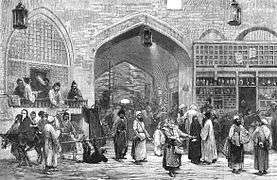 Bazaar in old Tehran, 1873
Bazaar in old Tehran, 1873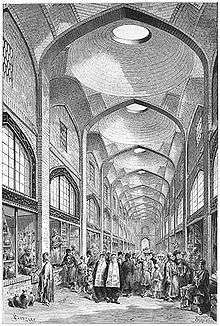 Vakil Bazaar from Jane Dieulafoy, Perzië, Chaldea en Susiane, 1881
Vakil Bazaar from Jane Dieulafoy, Perzië, Chaldea en Susiane, 1881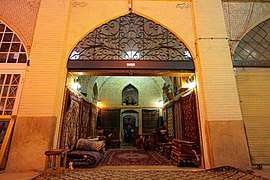 Vakil Bazaar
Vakil Bazaar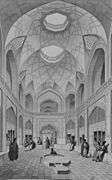 Bazar of Kashan by Pascal Coste, 1840
Bazar of Kashan by Pascal Coste, 1840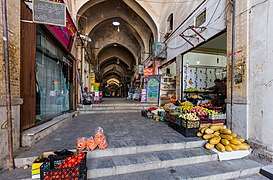 Bazaar ofe Kashan, Kashan, Irán
Bazaar ofe Kashan, Kashan, Irán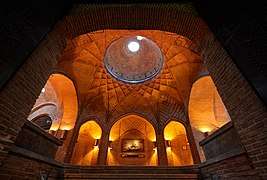 Caravanserai of Sa'd al-Saltaneh
Caravanserai of Sa'd al-Saltaneh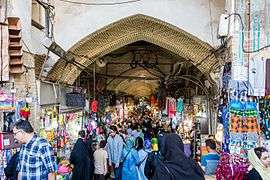 Bazaar de Teherán, Teherán, Irán
Bazaar de Teherán, Teherán, Irán
Kuwait
- Souq Almubarikiyya * Souq Avenues
Iraq
A Qaysari Bazaar is a type of covered bazaar typical of Iraq.
Kyrgyzstan
Lebanon
After sustaining irreparable damage during the country's civil war, Beirut's ancient souks have been completely modernised and rebuilt while maintaining the original ancient Greek street grid, major landmarks and street names.
- Bazaars and Souks of Old Cities of Tripoli – The ancient city of Tripoli has two separate old towns, both of which have large, well preserved souks, bazaars and khans of various specialties.
- Souk of Old Quarter of Byblos
- Souk of Old Quarter of Jounieh
- Souk of Old Quarter of Aley
- Bazaars and Souks of Old City of Sidon – The ancient, Southern city of Sidon has a large and well preserved old town that is divided into the Muslim, Christian and Jewish quarters, each of which contains souks, bazaars and khans of various specialties.
- Souk of Old City of Tyre
- Beirut Souks
North Macedonia
In the Balkans, the term, 'Bedesten' is used to describe a covered market or bazaar.
- Old Bazaar, Bitola
- Old Bazaar, Prilep
- Old Bazaar, Skopje
- Old Bazaar, Tetovo
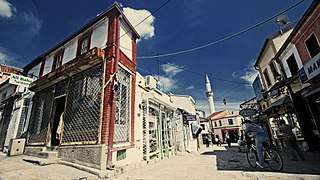 The Bazaar
The Bazaar- Belgrade street
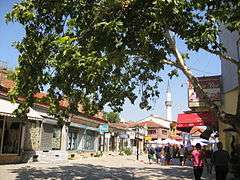 The Bazaar
The Bazaar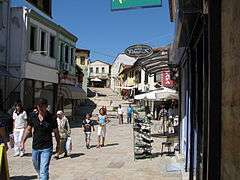 Street stairs
Street stairs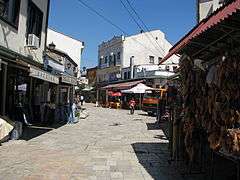 A street
A street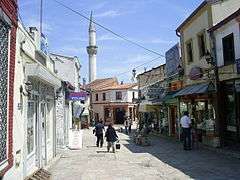 A street
A street- The entrance to the Bezisten
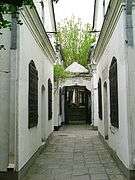 The Bezisten
The Bezisten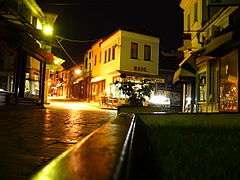 The Bazaar by night
The Bazaar by night
Malaysia
- Bukit Beruang Bazaar, Malacca
- Bazar Bukakbonet Gelang Patah, Johor Bahru
Nepal
- Asan, Kathmandu ceremonial bazaar and square
- Bishal Bazaar, Pokhara
- Gaushala Bazar, Mahottari District
- Khaireni, Gulmi District
- Namche Bazaar, Namche
- Purano Bazaar, KTM
- Naya Bazaar, KTM
- Newari bazaar
- Shyauli Bazaar Gandaki, Nepal
Norway
- Oslo Bazaars – a protected site
Pakistan
Hyderabad, Pakistan
- Shahi Bazaar, Hyderabad
- Sarafa Bazaar, Hyderabad
- Saddar (Hyderabad) in Pakistan
- Resham Bazaar, Hyderabad
- Saddar (Hyderabad) in Pakistan
Karachi
Kashmir
Lahore
- Anarkali Bazaar, Lahore
- Mochi Gate Bazaars, Walled City of Lahore
- Naulakha Bazaar, Lahore
- Naranki Bazaar[4]
- Raja Bazaar
- Urdu Bazaar, Lahore
Peshawar
- Qissa Khawani Bazaar, Peshawar
Punjab, Pakistan
- Chakdina Bazaar, Kharian Tehsil of Gujrat District, Punjab, Pakistan
- Chotaka Bazaar, Multan District
- Chowk Bazaar, Multan
- Moti Bazaar, Rawalpindi, Punjab
- Multani Bazaar, Multan District
- Rail Bazaar, Multan District
- Raja Bazaar, Rawalpindi
- Rasheed Shah Bazaar, Multan District
- Saddar in Karachi (Saddar bazaar refers to a main or central bazaar)
- Saddar, Rawalpindi
- Sarafa Bazaar, Rawalpindi
- Rawalpindi bazaars
- Urdu Bazaar, Rawalpindi, Punjab
- Urdu Bazaar, Multan
Rajdhani
- Gala Bazaar, Rajdhani
Sargodha
- Urdu Bazaar, Sargodha
- Dhak Bazaar, Shikarpur
.jpg) Qissa Khwani Bazaar, Peshawar, Pakistan
Qissa Khwani Bazaar, Peshawar, Pakistan Bazaar, Karachi, Pakistan
Bazaar, Karachi, Pakistan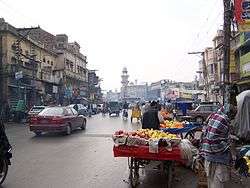 Rawalpindi Bazaar, Rawalpindi, Punjab
Rawalpindi Bazaar, Rawalpindi, Punjab
Serbia
- New Bazar, Novi Pazar
South Africa
- Marabastad, Pretoria also known as Asiatic Bazaar, Pretoria, South Africa
Sri Lanka
- Madawala Bazaar
Syria
- Al-Buzuriyah Souq in Damascus
- Al-Hamidiyah Souq in Damascus
- Souq Atwail in Damascus
- Souq Al Buzria in Damascus
- Mathaf Al Sulimani in Damascus
- Midhat Pasha Souq in Damascus
- Souq Al-Attareen (Perfumers' Souq) in Aleppo
- Souq Khan Al-Nahhaseen (Coopery Souq) in Aleppo
- Souq Al-Haddadeen (Blacksmiths' Souq) in Aleppo
- Suq Al-Saboun (Soap Souq) in Aleppo
- Suq Al-Atiq (the Old Souq) in Aleppo
- Al-Suweiqa (Suweiqa means "small souq" in Arabic) in Aleppo
- Suq Al-Hokedun (Hokedun means "spiritual house" in Armenian) in Aleppo
- The Fruit Bazaar, Damascus, painting by Margaret Thomas and reproduced in John E. Kelman, From Damascus to Palmyra, 1908
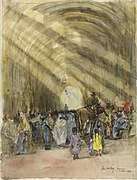 The Silk Bazaar, Damascus – Australians buying goods, 1918
The Silk Bazaar, Damascus – Australians buying goods, 1918_p133_ENTRANCE_TO_BAZAAR%2C_GAZA.jpg) Entrance to the Bazaar, Gaza
Entrance to the Bazaar, Gaza_p085_THE_BAZAAR_OF_EL_HARISH.jpg) The Bazaar of El Harish, 1881
The Bazaar of El Harish, 1881
Tanzania
- Darajani Market also known as Darajani Bazaar
Tunisia
Turkmenistan
- Gulistan Bazaar, (also known as the Russian Bazaar) Ashgabat
- Altyn Asyr Bazaar, Ashgabat (formerly Tolkuchka bazaar)
.jpg) Altyn Asyr Bazaar, Turkmenistan
Altyn Asyr Bazaar, Turkmenistan
Turkey
In Turkey, the term 'bazaars' is used in the English sense, to refer to a covered market place. In Turkish the term for bazaar is "çarşı."
 Kemeraltı (bazaar district), İzmir, Turkey
Kemeraltı (bazaar district), İzmir, Turkey Arasta Bazaar, Istanbul
Arasta Bazaar, Istanbul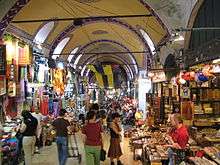 Grand Bazaar, Istanbul
Grand Bazaar, Istanbul Spice Bazaar, Istanbul
Spice Bazaar, Istanbul
Belarus
Uzbekistan
- Alay Bazaar, Tashkent
- Chorsu Bazaar, Tashkent[5]
- Chorsu (Samarkand)
- Siyob Bazaar, Samarkand
- Mirobod Bazaar, Tashkent
- 9 Bazaar, Navoiy
List of souqs
- Souks in Marrakesch Morocco
- Souks of Tunis
- List of souqs in Dubai, UAE
- Al Mina Fruit and Vegetable souq Abu Dhabi
- Al-Buzuriyah Souq, Damascus, Syria
- Al-Hamidiyah Souq Syria
- Al Souk Al Kabir Dubai
- Grand Socco Tangiers, Morocco
- Houmt El Souk (The Souq neighbourhood) Tunis
- Khan el-Khalili Egypt
- Mahane Yehuda Market Israel
- Manama Souq Bahrain
- Petit Socco, also known as "Souk Dakhli", Tangiers, Morocco
- Souk Ahras Algeria
- Souk Ech-Chaouachine Tunisia
- Souk Es Sekajine Tunisia
- Souk Lahad Tunisia
- Souk Jara Jordan
- Souq al-Madina Aleppo, Syria
- Souk al-Tawileh Lebanon
- Souk El Gharb Lebanon
- Souk Okaz Saudi Arabia
- Souq Waqif Qatar
- Souq Al-Mubarakiya Kuwait
References
- Crow, B., Markets, Class and Social Change: Trading Networks and Poverty in Rural South Asia, Palgrave, 2001, [Glossary] p. xvii
- Ahour, I., which dates to saljuqid era 11th century. its extension occurred in the safavid and kajar era. It is the largest roofed bazaar of the world. "The Qualities of Tabriz Historical Bazaar in Urban Planning and the Integration of its Potentials into Megamalls," Journal of Geography and Regional Planning, Vol. 4, No. 4, pp. 199–215, 2011, and for a contemporary account of the Bazaar see: Le Montagner, B., "Strolling through Iran's Tabriz Bazaar," The Guardian, 12 November 2014 Montagner, Boris Le (12 November 2014). "Strolling through Iran's Tabriz bazaar - in pictures". The Guardian.
- Assari, A., Mahesh, T.M., Emtehani, M.E. and Assari, E., "Comparative Sustainability of Bazaar in Iranian Traditional Cities: Case Studies of Isfahan and Tabriz," International Journal on "Technical and Physical Problems of Engineering", Vol. 3, no. 9, 2011, pp 18–24; Iran Chamber of Commerce,"Iran: Iranian Architecture and Monuments: Bazaar of Isfahan". www.iranchamber.com.
- Kashif Abbasi (14 January 2014). "Reacquainting with history: Narankari - a bazaar with a past, but no future | The Express Tribune". The Express Tribune.
- "Bazaars of Uzbekistan". Goldensteppes.com. Retrieved 2013-06-10.
.jpg)